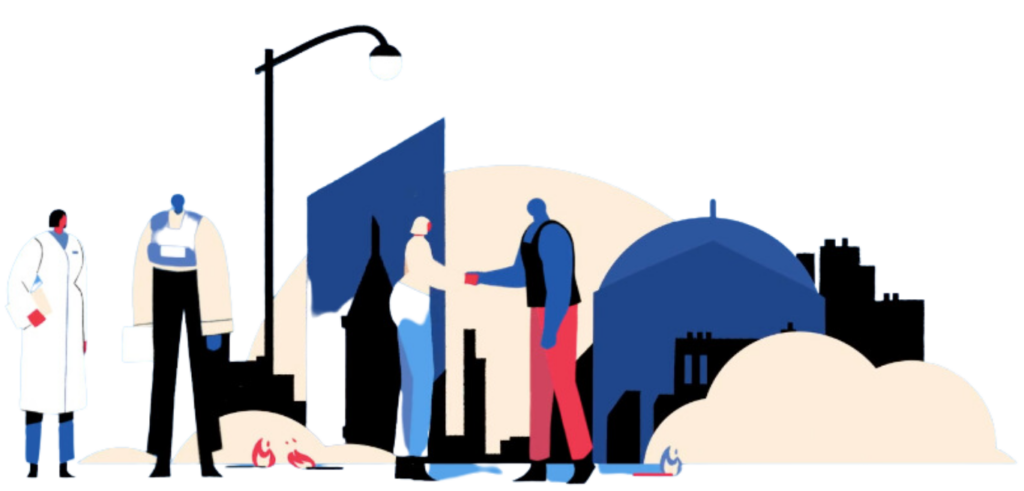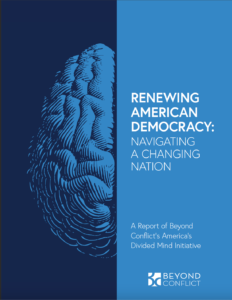Navigating A Changing Nation
New report explains the need to expand our focus beyond polarization to explore a broader range of psychological processes that drive social division and threaten American democracy.
Renewing American Democracy: Navigating A Changing Nation analyzes America’s current social divides through the lens of social science to understand how threats–both real and perceived–shape our sense of identity, our feelings of belonging, and our perceptions of status and power relations in society, all of which have downstream impacts on our behavior, and ultimately, the health of our democracy.
The study builds on Beyond Conflict’s earlier research on partisan divides and its Understanding the Psychology that Drives Us Apart report, to expand the focus beyond polarization to explore a broader range of psychological processes that drive social division and threaten American democracy.
The Problem
- Hyperpartisanship—and the social divisions that drive it—are undermining Americans’ ability to come together across lines of differences to devise solutions to common problems.
- Threats to the health and function of democracy in the United States have individual, collective, and systemic causes. Yet, organized responses tend to be concentrated at the individual and institutional levels. What is often missing from this analysis is critical attention to motivations and drivers borne of social identity.
- The US is rapidly changing in a way that heightens uncertainty, triggers perceptions of threat, and increases the impulse to protect what feels safe and familiar. Particularly for majority groups, these changes could be perceived as identity threats––fear, conscious or subconscious, over losing their relative power and status.
- Increases in perceptions of identity threat among majority group members, can lead to greater support for populism and authoritarian tactics, making it more difficult to see ourselves as a unified American people and work cooperatively together to solve the pressing challenges of our time.

The Psychology
Three themes undergird the specific identity-related drivers of division suggested as focus areas for intervention:

- Threat. Analogous to a person’s desire to feel a sense of physical safety, threats to the status or wellbeing of the social groups to which we belong can elicit defensive and self-protective responses. When individuals belong to powerful groups, they can view the influence of lower status groups as threats to their group’s standing, while individuals belonging to less powerful groups can be motivated to challenge the status quo to improve their group’s position.
- Competition. Identity threats can be inflamed by competitive victimhood––the tendency for adversarial groups to claim that their group has suffered more than the other. In this way, competitive victimhood might further underpin the zero-sum perceptions that there will be “winners” and “losers,” and that one group’s needs can only be met when the other side compromises or accepts defeat.
- Exclusion. The more we socially exclude members of other groups from dialogue and decision making, the more this undermines the other side’s sense of security that allows them to feel open to differing perspectives. Social inclusion, on the other hand, particularly that which extends across groups, has been shown to reduce prejudice and correspond with greater support for equity-driven policies.
The Paths for Intervention
The report offers interrelated and interdependent intervention paths designed around four primary identity-related drivers of social division in the US: (1) Factionalism and Partisan Sorting; (2) Residential Segregation and Declining Social Trust; (3) Information Echo Chambers; and (4) Divergent Racial Attitudes and Support for Racial Equity. The interventions identified are intended to be illustrative rather than comprehensive in the hopes that they stimulate creative innovation and application by the many policymakers, practitioners, advocates, and philanthropists dedicated to reinvigorating American democracy ––
Factionalism and Partisan Sorting
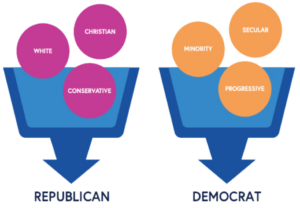
Political affiliation has become increasingly linked with other important social identities, such as race, ethnicity, religion, and nationality. Republicans increasingly identify as ‘White,’ Christian,’ and ‘rural,’ and Democrats as ‘Black,’ ‘Latino,’ ‘Asian,’ ‘secular,’ and ‘urban.’ This alignment increases political polarization and distrust across party lines.
Intervention Pathways:
- Increase openness toward informed and realistic intergroup engagement
- Highlight identities that include and cut across partisan differences, creating space to redefine American identity
- Normalize disagreement as central to democracy
- Increase use of electoral methods that encourage cross-party coalitions
Residential Segregation and Declining Social Trust
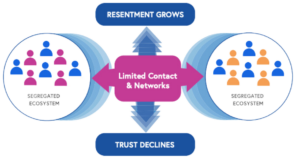
Identity-based concerns are compounded by geographic segregation, which allows for the acceptance of negative and exaggerated stereotypes about the other, and misinformation about their intentions or behaviors. When groups are segregated from each other, they are less likely to have first-hand experience or familiarity with other groups that may counter the influences of divisive messaging or status threat.
Intervention Pathways:
- Organize opportunities for cross-party engagement between citizens and
elected officials - Facilitate positive intergroup contact
- Increase funding for place-based civic bridging efforts
- Increase use of electoral methods that encourage cross-party coalitions
Information Echo Chambers
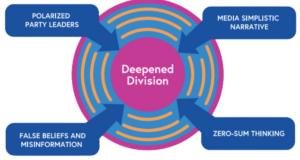
The divisions between partisan and other groups are further fueled by divisive partisan media coverage, exaggerating conflict narratives. The overly simplistic narratives commonplace in media reinforce the often overstated and zero-sum positions of party leaders, which position that the other poses a dire threat to one’s party and associated social groups. This one-sided coverage can also limit the consideration of opposing viewpoints, contributing to partisans’ overly negative perceptions of the other side’s intentions.
Intervention Pathways:
- Correct Americans’ “meta-misperceptions” or what people think others believe
- Complicate the narrative by challenging sweeping assumptions
- Engage media personalities to model new rules and norms for civil discourse
- Invest in and sustain local news ecosystems
Divergent Racial Attitudes and Support for Racial Equity
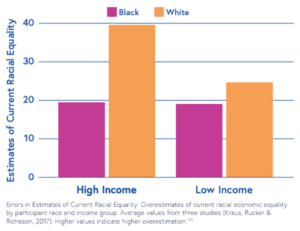
Factionalism, bolstered by geographic and virtual segregation, leads partisans to accept widely divergent beliefs about racial progress and the different causes of racial inequality in the US. Americans’ racial attitudes spill over to fuel stark differences.
Intervention Pathways:
- Disrupt belief in the racial-progress narrative
- Discuss difference
- Building cross-group, multi-racial coalitions
- Open a more inclusive dialogue on US history
While a broad range of psychological processes drive social division, including perceptions of threat, competition, and exclusion, there are many actions that can be taken to increase positive exposure and engagement across group lines. Now is our time to re-rebuild our democracy, and it will take all of us, working on multi-faceted solutions at the local, state, and national levels. Only then can we re-envision a society where we don’t fear and dismiss one another, but a society where we all depend on one another.
